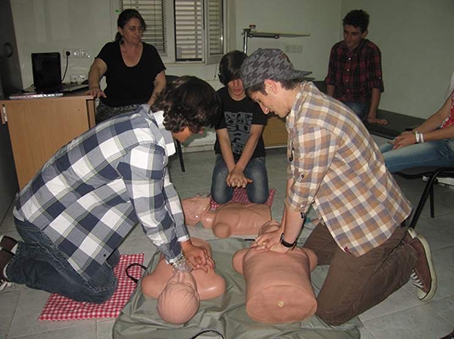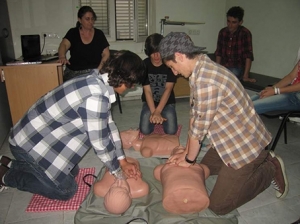GENESIS Continuing to Protect Georgia’s Vulnerable Youngsters
The association GENESIS was established 20 years ago to support and promote the health and well-being of orphans, street children and the most vulnerable populations of Georgia. It helps these vulnerable groups within the Georgian population gain access to healthcare services, promotes healthcare awareness and brings together communities to make sustainable changes. The organization has carried out projects with the help of Swiss, Dutch and German donors. Georgia Today met Maia Mgaloblishvili-Ryan, doctor-pediatric and founder of Genesis and talked with her in detail about the association.
Maia Mgaloblishvili-Ryan – “We founded the association Genesis in 1995 and our whole attention was paid to underprivileged children and young people. From the beginning we started with orphans and social orphans who had parents but due to poverty they could not afford to look after them and they were sent to the children’s home, and also street children. By that time, 6000 children were in those institutions for young people under 18 years. 1000 children under permanent care that included medical assistance too as we are doctors. Besides, we would contact our foreign friends to seek the funds to help them. At that time we found very severe conditions that were previously unknown. I will refrain from listing the orphanages where we found indescribable conditions. The children slept on mattresses. Some of them had enuresis problems after which those matrasses were not cleaned. There were terrible hygiene conditions and inadequate food as well. However, there were exceptions, and a handful of children’s homes had excellent conditions. One of them was a children’s house in Aspindza, Samtskhe-Javakheti region where the children were cared as though they were real family. As for the children’s psychological state, even basic attention we would pay to them was a luxury for them. Even during medical tests, other children would come up to us and ask to do the same to them. It is a bit weird because generally in this case children are scared of pain and that unpleasant process, which is accompanied by a medical examination but there they were very interested.
MT: How many houses have you served?
There were nine houses which we repaired and equipped with the help of foreign partners. Also, we would conduct training sessions on children’s rights. Together with us, a volunteer activity was conducted by Lia Makhashavria, a lawyer and human rights advocate. The children did not even know what their rights were. They did not know that beating and abuse was not normal. For 12 years we operated a charity clinic where surgery, therapy, cardiology, ultrasound services and laboratory was available and all this we did only with our own funds. If there was a great need for surgery, the children were taken to the hospitals. Then the state could not afford to help. Generally, we were helped by Swiss agencies and German foundations but we also had private donors. During this time, along with the charity clinic we opened medical assistance clinics for poor people in Adjara and it still works there and in Kakheti. At this time, when the primary health care system was destroyed, we served 15 000 residents with very complex medical assistance with the support of Netherlands Oxfam for 10 years.
As for the children deprived of parental care, these houses were closed in 2005 during deinstitutionalization. As a result, some of the children returned to their parents, or were adopted and others reached 18 years of age and left the houses. Currently, 44 small houses function and there are 8-10 children, totally 600 children. Another 5000 teenagers would receive state aid, but very little. A certain number of children again returned to the streets. We carried out special programs for those who left the houses and are already 18 years old or those who returned to their homes but have no appropriate conditions and education. Through those programs, 80 young people up to 24 years old were trained with essential skills for life. Besides, we started intensive working with employers to motivate them to employ them. This training lasted for three months, and there was a 6 months monitoring period. During this period, 61 children were employed and trained. Some of them had no social, communication, or team work skills. They did not know what taxes were. Simultaneously, we worked with different government bodies and presented a bill in the parliament and asked to grant young people leaving care socially vulnerable status. The work in this direction continues. We hope that along with the government and other organizations will be involved in this process. We have a large group of disable children and adults to care for. We mainly work with them in Adjara. Our first clinic, which is located there, is a neuro and orthopedic rehabilitation center which we open with the help of the Dutch and the Japanese people. Later, a rehabilitation services center was added to it. Now it has been bought by the Ministry of Health of Adjara and is operated with the involvement of the local municipality. I would like to note that the government of Adjara works very effectively. It is a very productive body because it’s much quicker to bring their attention to the problem and their response is very good. We have innate physically and mentally disabled children Dyspraxia and dyslexia are attention deficit hyperactivity disorders. Often these children’s IQ is fine but their perception and concentration skills need help from a young age but the system is not yet implemented. One child in 10-12 suffers from dyslexia. There are no statistics of it in Georgia but these are world statistics. These disorders are absolutely curable.
One more thing that we have seen so far is children’s rights violations. Domestic violence, violence outside, bullying, neglecting, pressure. There is also sexual abuse and an increased number of suicides in teens in Georgia. This does not happen only due to social or economic conditions. There are other forms of child neglect occurring in rich families. In such facilities, a child might feel abounded because of their parents’ lack of time. Strange as it may sound, children’s overloading with school subjects is a form of violence. Very often children have no free time. According to the convention playing and leisure time is a child’s right that is violated in these cases. Intensive work is to be conducted in schools with parents in order to build public awareness on the child’s rights. Children’s rights violations are not infringed only with physical or sexual abuse. A child needs free space and a real childhood. If the child’s rights are violated in materially perfect families, imagine what kind of violence happens with unaccompanied children. Our work has shown us a clear picture of what is happening in this direction.
In 2013, UNICEF published a report regarding this issue. There are other countries’ reports where it is written in detail what each teacher should know. We want to launch a child abuse prevention program and safeguard the environment in kindergartens and schools, and currently are working on this issue.
Meri Taliashvili












